
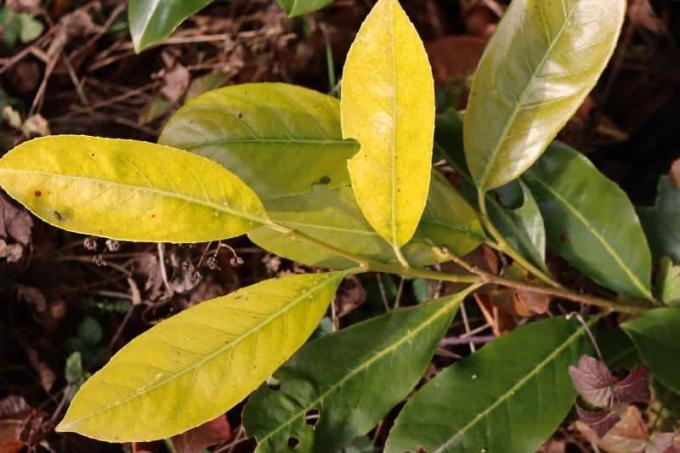
Table of contents
- Floor
- Iron and nitrogen deficiency
- frost drought
- potassium deficiency
- shotgun disease
- sunburn
- lack of water
- frequently asked Questions
Cherry laurel is one of the hardy garden plants in the garden. Nevertheless, it can happen that the leaves of the cherry laurel turn yellow or brown. The causes are manifold. Since some can kill the cherry laurel, you should investigate.
Floor
Although the cherry laurel (Prunus laurocerasus) does not make high demands on the soil, the subsoil can be the cause of yellow leaves. The leaf discoloration usually occurs in garden soils that
- are poorly ventilated or
- moist.

Since the taproot of the laurel cherry grows a good two meters deep, the soil should not be compacted even in deeper layers.
A notice:
In the case of compacted soils, there is often the problem of waterlogging, since the rainwater cannot drain off. Typical signs of root rot are yellow leaves.
The solution to the problem is complex:
- Dig up laurel cherry
- incorporate coarse building sand into the soil
- Put back the cherry laurel
A notice:
Is a compacted soil the cause of yellow leaves, this is already evident in the first years of the laurel cherry. This makes the tedious digging up a bit easier, as the plant does not grow as quickly.
Iron and nitrogen deficiency
Iron and nitrogen deficiencies cause cherry laurel foliage to turn yellow. It is easy to tell whether nitrogen or iron is missing:
- iron deficiency: yellow leaves with green veins
- nitrogen deficiency: Yellowing of the entire leaf including leaf veins
Give the cherry laurel a portion mineral fertilizer as emergency aid. As a preventive measure, feed the plant with three liters compost per square meter in spring.
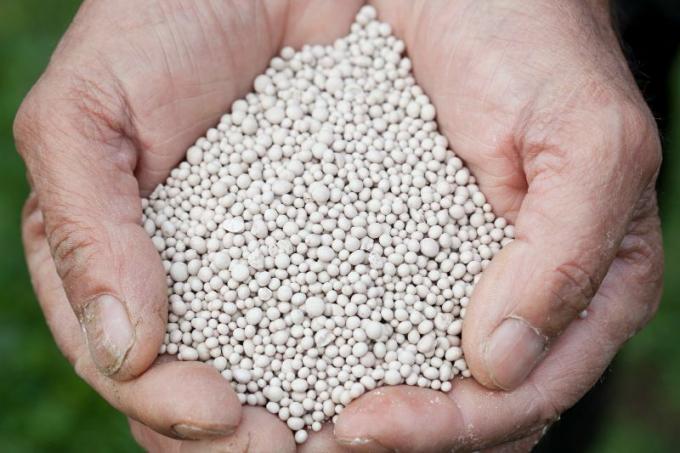
Tip:
Despite iron deficiency fertilization repeated on, you should use the Test soil pH. If it is very high, this can be the cause of the deficiency symptoms.
frost drought
Do the leaves or entire branches of the cherry laurel turn color in winter yellow, it is the so-called frost drought.
Leaves that have dried up due to frost can no longer be saved. You should therefore make sure that the laurel cherry does not suffer from drought even in winter:
- if the ground is not frozen, water occasionally
- Leaves against the drying winter sun with a fleece cover
- Cut off frozen branches in spring
- Fertilize laurel cherry with Patenkali in autumn (increases resistance to frost damage)
potassium deficiency
have older Leaves brown, dead leaf edges and spikes, Prunus laurocerasus suffers from potassium deficiency. If nothing is done about it, the symptoms will also show up in younger leaves.
Tip:
Potassium deficiency is particularly common in sandy soils with a low pH value. There is also an increased danger in heavy clay soils, since the potassium is fixed there.

In acute cases, you can help the cherry laurel with a potassium fertilizer. Since the plant absorbs the fertilizer quickly, you should notice an improvement promptly. In the long term, you can prevent a potassium deficiency by regularly fertilizing the laurel cherry with a tree, shrub or hedge fertilizer with a high potassium content.
shotgun disease
The shotgun disease occurs particularly frequently and strongly after a rainy spring. You can recognize the fungal disease by the following symptoms:
- Leaf parts with yellow marbling
- round holes in some places
If you find an infection, you should to act quickly:
- Cut off infested parts of the plant (disinfect secateurs after each cut)
- Collect clippings and dispose of in organic waste
- Treat cherry laurel with clay or copper preparations
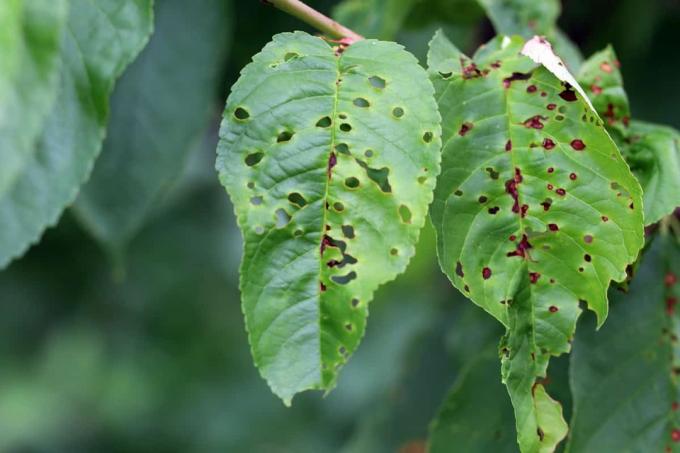
Horsetail manure or net sulfur is used as a preventive measure to strengthen the laurel cherry. A thick layer of mulch also prevents infection.
sunburn
If the soil is very dry, the sun will burn the leaves of the cherry laurel. The damage occurs on those parts of the leaf that are particularly exposed to sunlight. It does not necessarily have to turn the entire leaf yellow or brown.
In the case of sunburn, there is no real solution, because the burnt leaves can no longer be saved. You should therefore make sure that the laurel cherry does not suffer from drought.
lack of water
If the water supply of the cherry laurel is poor, the leaves will turn yellow after dry summers. However, since this occurs with a time delay, it is difficult to identify the cause, because the leaves often only turn yellow when the lack of water has long since passed.
To solve this problem, mulch the cherry laurel with leaves or other organic matter.
frequently asked Questions
The cherry laurel tolerates pruning very well. To avoid yellow or brown leaves or To remove branches, you can cut down to healthy wood. After cutting, you should water the plant extensively. Choose an overcast, frost-free day for pruning.
A broth of onions or garlic helps prevent the fungal infection. Water the cherry laurel with it regularly. Alternatively, you can put onions and garlic as neighbors to the laurel cherry.
 Mandy
Mandy
Learn more about shrubs

12 native evergreen shrubs & woody plants
Dreary, bare trees and bushes in winter? It doesn't have to be. Even in the European climatic conditions, native, evergreen trees thrive splendidly. The variety of species even enables the gardener to adapt his privacy hedge exactly to his garden design. This guide presents the most beautiful native and evergreen shrubs and woody plants.

Curb Vinegar | Does bucket or root barrier help?
Vinegar trees like to spread in the garden and sometimes even drive other plants away. However, this can be avoided by curbing the growth of the trees. You can find out which methods are best suited for this here!

Rhododendron has dried up: how to save it | Rododendron
Even if the rhododendron is withered and no longer sprout, it does not have to be dead. The plant can look completely dried up above ground, but there is often still life in the roots. It is therefore worth taking appropriate measures to save the flowering shrub.

Winter jasmine, Jasminum nudiflorum | Care, propagation & pruning
The winter jasmine is a relatively frugal and robust plant that can cope with many different site conditions. The plant enchants with bright yellow flowers in winter and tolerates deep sub-zero temperatures very well. It should be pruned regularly and is easy to propagate.
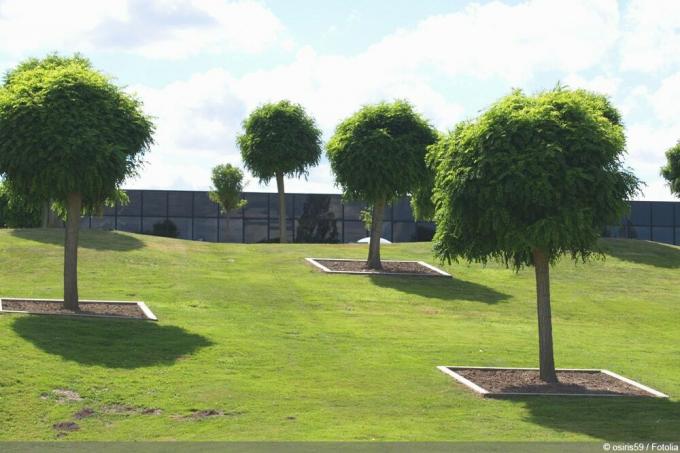
Ball Tree: Care from A – Z | These 9 varieties are suitable for ball trees
Ball trees adorn many a garden, front yard and entrance area. They require little space. Their trunk thickens with age, but its height remains the same. The spherical crown is easy to trim. Nevertheless, they offer everything that makes a tree.
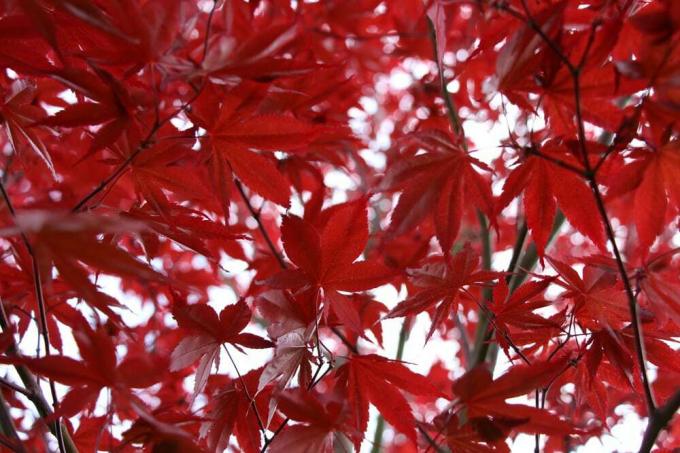
Red Norway Maple: Basic Care | Red-leaved maple
Red maple is well on the way to overtaking its green-leaved counterpart as a popular house tree. This guide will acquaint you with the basics of care so that the red-leaved premium variety can make the most of a representative welcoming committee in the garden.
